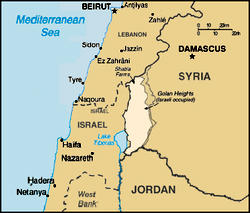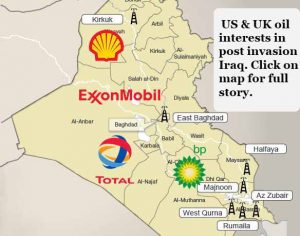Yesterday an Al-Monitor piece by Akiva Eldar contrasted Netanyahu’s success in getting Trump out of the Iranian nuclear deal,1 and to ‘recognise’ Jerusalem as Israel’s capital, with his failure to pull off the same in Europe. Eldar also finds time to work in an aside on the Golan Heights:
Here, too, [Netanyahu] can take credit for a major victory: Last month’s annual [US] State Department report on human rights around the world replaced “occupied territories” with “Israel, the Golan Heights, West Bank and Gaza.” If there’s no occupation, Israel can do whatever it wants in these territories, including theft of Palestinian lands, abuse of its residents and even deportation. If there is no occupation, Palestinians can be uprooted to make way for Jewish settlements, the 1993 Oslo Accord can be erased from the history books and such trivialities as international law can be ignored.
… the Golan was focus of a power struggle between the Kings of Israel and the Aramaeans based near modern-day Damascus. The Itureans, an Arab or Aramaic people, settled there in the 2nd century BCE and remained until the end of the Byzantine era. Jewish settlement in the region came to an end in 636 CE when it was conquered by Arabs under Umar ibn al-Khattāb.2. In the 16th century, the Golan was conquered by the Ottoman Empire and part of the Vilayet of Damascus until it was transferred to French control in 1918. When the mandate terminated in 1946, it became part of the newly independent Syrian Republic.
Between 1967 and the beginning of the Syrian Civil War, the western two-thirds of the Golan Heights had become occupied and administered by Israel, whereas the eastern third had remained under control of the Syrian Arab Republic, with the UNDOF maintaining a 266 km buffer zone … Construction of Israeli settlements began in the remainder of the territory held by Israel .. until [Israel extended its] administration throughout the territory in 1981 .. UN Resolution 497 stated that “the Israeli decision to impose its laws, jurisdiction and administration in the occupied Syrian Golan Heights is null and void and without international legal effect.” Israel maintains it has a right to retain the Golan, citing UN Resolution 242, which calls for “safe and recognised boundaries free from threats or acts of force”. However, the international community rejects Israeli claims to title to the territory and regards it as sovereign Syrian territory.
The description of Syria’s assault as a ‘civil war’ aside, the above is uncontentious to other than hardline Zionists, and sheds light on Akiva Eldar’s tone in Al-Monitor yesterday. A liberal, he is offended by the “theft of Palestinian lands” and by a power status quo in which “such trivialities as international law can be ignored”. But there’s another aspect to the Golan issue, one neither he nor mainstream media are speaking of.
The Golan has oil. Billions of barrels, says the Economist. More than Saudi Arabia, say others.
Even then it is anachronistic as well as overly reductive to suppose the pipeline is key to Syria’s ordeal. Damascus did not tilt from the West’s favoured Quatar route, to sign up for the more northerly Russia backed route from Iran, until 2011. But we know from sources as highly placed as General Wesley Clark and Mitterand’s Foreign Minister Roland Dumas that Washington and its junior partners in London had decided long before this (and before the Daraa Protests) that Assad was to go.
No, the oil pipeline aspect of the dirty war on Syria is subsumed under bigger questions of US ability to maintain regional and even global hegemony in the face of threats from China’s One Belt One Road project, the Asian Infrastructure Investment Bank (a significant challenge to the IMF and hence to neoliberal fiscal policing of the planet) and growing realisation in all sectors of Russian and Iranian society that the USA is not to be trusted, and that this is neither new to Trump’s presidency nor likely to change when it ends.3
But this picture shifts – I don’t say decisively but significantly – when Syria is taken, as indeed it should be taken, to include the Golan. The presence of oil there first came to my notice in that Economist piece of 2015. (It turns out Craig Murray, the Ambassador to Uzbekistan sacked by Blair for embarrassing him over the company he was keeping to expedite the war on Iraq, was blogging on this as early as 2013.) The Economist does not make the more-oil-than-Saudi claim but does have US based Genie Energy suggesting, on the back of test drillings, an oil reservoir “with the potential of billions of barrels”.
Note the matter of fact reporting, as though it were the most natural thing in the world for a US Oil Corporation to do test drills in Syrian territory unlawfully administered by Israel. It puts me in mind of Stephen Gowans’ recent piece, reposted in full and with his permission on this site as Privatising Syria.
Just over a month ago, Christina Lin wrote in Asia Times that:
Israel has intensified its defense of the Golan. Last June, when a mortar shell landed in the Golan, the Israeli air force attacked Syrian army positions in the village of Samadanieh al Sharqiyah in Quneitra province. In February, after its F-16 crashed in Syria, Israeli airstrikes took out half of Syria’s air defense and fired ground-to-ground rockets from the Golan Heights. It also supports rebel groups as a buffer force to keep the Syrian army and Iran-backed Hezbollah at bay.
In itself, there’s nothing out of the ordinary here. Other than an observation I made at the time, to the effect of the potential for WW3, this was pretty much business as usual: just another day in the life of the IDF. But context matters, and the title of Lin’s piece is Partition of Syria: US and Israel eye Golan Heights Oil. She goes on to say:
By maintaining a US military presence in Syria and partitioning the country into spheres of influence similar to China in the 19th century, it would facilitate Israeli annexation of the Golan and allow US/Israeli energy companies to exploit the oil reserves.
For ‘partitioning’ we can here validly substitute balkanisation – a parallel drawn on this site in a Letter from Slovenia to Syria. But Lin, Fellow of the Center for Transatlantic Relations at SAIS-Johns Hopkins in Bologna, is described here as focusing “on China’s increasing footprint in the Mediterranean Basin and on ways that China, NATO, and U.S. allies can cooperate to resolve regional security issues”. Her restrained tone, other publications4 and place of employment all speak to a belief that synergy of interests between China and the USA is possible.
Me, I wish I’d the word power to vent the depth and fulness of my anger at our rulers’ venality, deceit and hypocrisy. The best I can do is say it as I see it, and explain what I see in terms of the need for anyone with an ounce of moral intelligence to wake up, smell the coffee and see we are governed by puppets and ruled by crooks with blood on their hands. Realise, in short, that the interests of profit override any other consideration.
The suffering of the Syrian people? Here’s what the Sunday Times would have us believe …
… but as you may well have heard on the grapevine, the Sunday Times is owned by one Rupert Murdoch. What you may not have heard till now is that Mr Murdoch sits on the Genie Energy advisory board. As do Dick Cheney, Larry Summers, former CIA Director James Woolsey, Jacob Rothschild and Louisiana Senator Marry Landrieu, a Democrat who lost her seat to Republican Bill Cassidy in 2014, but not before she’d chaired the Senate Committee on Energy and Natural Resources – from which position she successfully sponsored the US-Israel Energy Cooperation Bill. Landrieu is still a member of the lobby group, American Israel Public Affairs Committee.
Couldn’t make it up, could you? Like I said, wake up and smell the coffee.
* * *
- On the bare bones of the Obama deal this brief summary is worth reading – though its assumptions of the US as benign, Iran as global menace, could not be further from my own.
- A separate Wiki page describes Umar as “one of the most powerful and influential Muslim caliphs in history [and] a senior companion of the Prophet Muhammad”, then goes on to say he “is revered in the Sunni tradition as a great ruler and paragon of Islamic virtues … [but] viewed negatively in the Shia tradition”.
- It was not Trump, for instance, who assured Gorbachev in 1990 that NATO would not expand “a single inch eastwards“. And Washington’s conduct has been incurring the mistrust of Iranians for the past sixty-five years.
- I confess I haven’t read any, but her titles include ‘China’s Pivot West: Opportunities for Cooperative Security’, ‘The Mideast: a laboratory for US-EU maritime cooperation with China?’ and ‘Liberal Order in a Post Western World’. I hope to find time to read her, with guarded interest. Interest because I’m sure Dr Lin, who can’t be at all happy with Trump’s idiocy, is well informed and sincere in her hopes for Sino-US harmony. Guarded because, as with Reagan appointee Stephen Cohen – for whom I have great respect, but find him naive in regarding US hostility to Russia under four successive administrations as mistaken – she underestimates the resolve of the US ruling class to see off at any cost the growing challenge from China (and to lesser degree Russia) to its exceptionalist licence to plunder the planet.



